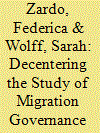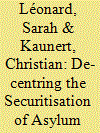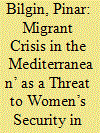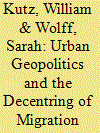|
|
|
Sort Order |
|
|
|
Items / Page
|
|
|
|
|
|
|
| Srl | Item |
| 1 |
ID:
189110


|
|
|
|
|
| Summary/Abstract |
This paper argues in favour of a radical de-centring of our understanding of international migration governance that privileges the viewpoints of origin and transit countries, non-state actors and includes both urban and rural perspectives. Building on the contributions to this Special Issue, I propose a plural understanding of governance and elaborate on the different dimensions along which we can de-centre our understanding of the governance of international migration (and of the related political and policy discourses). The paper starts by discussing the 21st century context within which migration governance is inscribed and proposes a working definition of de-centring and pluralizing our understanding of migration governance. I then introduce the multiple ways in which we can think of this de-centring: along a geopolitical approach that gives primacy to the role that countries play in migration processes; along a spatial approach (views from the city vs views from rural areas); or with reference to the actors involved (state, civil society, private sector, migrants and their households). The paper concludes by discussing the importance of such radical de-centring for our thinking and speaking about migration.
|
|
|
|
|
|
|
|
|
|
|
|
|
|
|
|
| 2 |
ID:
189104


|
|
|
|
|
| Summary/Abstract |
To what extent can a decentred approach improve our understanding of migration governance? In the field of public policy, it ‘highlights the diverse and contingent meanings that inform the actions of the individuals involved in all kinds of practices of rule’ (Bevir Citation2016, 232). In this special issue we engage indeed not only with decentring the institutions and actors involved, but also the meanings produced, narratives constructed as well as the practices they entail. Applied to the context of international relations and political geography, decentring pays attention to actors´ perceptions and practices that shape the negotiation process (El Qadim Citation2018; İşleyen Citation2018b). It also normatively engages with deconstructing dominant assumptions in the study of world politics (Bilgin Citation2017). In their call for a paradigm shift in the study of the European Union (EU)’s international relations, Fisher Onar and Nicolaïdis argue that decentring involves, first, unpacking “the social scientific categories, assumptions and paradigm that underpin Eurocentric truth claims” and then “engaging with the assumptions and worldviews that underpin others’ accounts” (Onar and Nicolaïdis Citation2013, 286).
|
|
|
|
|
|
|
|
|
|
|
|
|
|
|
|
| 3 |
ID:
189106


|
|
|
|
|
| Summary/Abstract |
This article contributes to the debates on de-centring the analysis of migration governance in Europe by focusing on the potential role of external actors in the securitisation of asylum and migration in the European Union (EU). Although there has been a growing amount of literature on the securitisation of asylum and migration in the EU, the role possibly played by external actors in this securitisation process has not been considered to date. This article addresses this gap using the case of Turkey. Theoretically, it contributes to the development of the securitisation framework by de-centring the study of securitisation processes. It argues that, from the vantage point of an external actor, a securitisation process highlights the existence of a vulnerability to a specific phenomenon that is perceived to be threatening. An external actor can then decide to exploit this vulnerability for its own gain, notably by making threats that play on the fears of the other political actor. Empirically, the article demonstrates how the Turkish government has been able to exploit the vulnerability of European countries to migration flows, which had been highlighted by the social construction of asylum and migration as security issues. By repeatedly threatening to send more asylum-seekers and migrants Europe’s way, the Turkish authorities have managed to secure some significant financial and political benefits for themselves in the last few years.
|
|
|
|
|
|
|
|
|
|
|
|
|
|
|
|
| 4 |
ID:
189118


|
|
|
|
|
| Summary/Abstract |
We may be witnessing the emergence of a new ‘state capitalist’ normal, a term this Forum proposes to problematise in its geopolitical dimensions. The growing prevalence of state-sponsored entities (encompassing state enterprises, policy banks, and sovereign wealth funds) as leading vehicles of economic activity is a defining feature of our times. This reassertion of state authority is altering configurations of state and corporate power across the world economy while generating a multiplicity of geopolitical tensions. This Forum reflects upon what it means, theoretically, methodologically, and politically, to articulate a geopolitics of contemporary state capitalism. It brings together interventions which draw on various theoretical approaches, including critical political geography, historical materialism, geographical political economy, and power structure research, in order to probe into the multiple spatialities at the core of contemporary state capitalism. The contributions aim to destabilise the assumptions and taken-for-granted ideas which have largely framed the debate thus far, including problematic binaries such as liberal/illiberal, state/market, commercial/geopolitical logics, and realist narratives of interstate power-maximising behaviour. Studying the (geo)political re-organisation of global capitalism requires moving beyond the castigation of a ‘rogue’ state capitalism as well as narratives of a clash between rival political-economic models, and disassembling the category state capitalism.
|
|
|
|
|
|
|
|
|
|
|
|
|
|
|
|
| 5 |
ID:
189111


|
|
|
|
|
| Summary/Abstract |
With China’s continuous rise and growing external commercial, strategic, and political endeavours, questions have arisen about the motivation, timing, and locale of China’s outreaching strategies. This research analyzes China’s overseas port investments through a comparative study of Greece and Pakistan, two important partners of China’s Belt and Road Initiative. Adopting the neoclassical realist framework and drawing on expert interviews, official statistics, and policy documents, this paper reveals how China’s economic security objectives in combination with changing geopolitical structures led to its external port investments. This research contributes to the studies on rising powers and geopolitics by showing how China as a rising power capitalizes on geopolitical opportunities created by the changing interests of dominant powers to expand its presence in strategically important regions.
|
|
|
|
|
|
|
|
|
|
|
|
|
|
|
|
| 6 |
ID:
189114


|
|
|
|
|
| Summary/Abstract |
In Latin America — the region with the biggest tropical forest on the planet and the largest potential for agricultural expansion — food security and food sovereignty are two competing approaches to food policies. Drawing on decolonial approaches to political geography, this paper provides a comparative analysis of food policies in the four countries (Peru, Colombia, Ecuador, and Bolivia) that make up the Andean Community of Nations (CAN), a supranational organisation that has enacted a regional food policy aimed at reconciling neoliberal and social orientations of its country-members. The paper contributes to the literature that highlights the multi-scalar nature of food security and food sovereignty by exploring the contentious building of food institutions from the grassroots to national and supranational scales in the Andean region. It also contributes to the critiques that highlight the limits to decolonization by explaining how – apart from hydrocarbon and mining dependence – food policies also express the permanence of coloniality in plurinational states. The paper argues that Andean supranational policies are apparent efforts to balance and harmonize the different interests at stake when actually reinforce a neocolonial sovereign state power that deepens the scalar tensions by intensifying the extractive transnational agriculture over pro-indigenous agriculture.
|
|
|
|
|
|
|
|
|
|
|
|
|
|
|
|
| 7 |
ID:
189108


|
|
|
|
|
| Summary/Abstract |
The decentring agenda in European Studies has called for turning our gaze from the ‘centre’ towards the ‘periphery’. This essay offers one decentred approach to EU migration governance in the Mediterranean: Studying geopolitical encounters between the receiving and sending spaces as constitutive of the very issues that are otherwise portrayed as autonomously developed. I will do this by adopting Edward Said’s method of contrapuntal reading, which involves ‘thinking through and interpreting together’ narratives from different parts of the world towards recovering ‘intertwined and overlapping histories’ of humankind. The specific case I look at is the 2015 ‘migrant crisis in the Mediterranean’ and the ways in which women’s insecurities were portrayed. While such representations presume women’s insecurities to have developed in the South/east and arrived in the North/west via migration, a contrapuntal reading of Fatima Mernissi’s writings together with everyday portrayals of the ‘crisis’ points to the connectedness of otherwise differentiated experiences. What is represented as ‘before Europe’ (in Bernard McGrane's felicitous turn of phrase) is, at the same time, the ‘aftermath of Europe’ insofar as geopolitical encounters between North/west and South/east of the Mediterranean have been constitutive of women’s insecurities.
|
|
|
|
|
|
|
|
|
|
|
|
|
|
|
|
| 8 |
ID:
189109


|
|
|
|
|
| Summary/Abstract |
Drawing on an ever-evolving corpus of scholarly, political, and public texts, this article reflects on the temporalisation and territorialisation of Africa in response to Europe’s ‘migration crisis.’ Re-awakened fears of the African other and its own divisive internal politics have presented Europe’s leaders with a dilemma: how to contain African ambitions to move while remaining true to their self-professed commitment to individual freedom, universal rights, and global progress. To solve it, Europe has updated longstanding colonial narratives and identities by constructing a timespace trap. This trap justifies exclusion as readying Africa for an elusive global future. Employing temporal forms of socio-spatial governance, the Europeans dangle a global and mobile future to Africans willing to mould themselves into externally defined parameters of moral respectability. Adherence to immigration regulations authored and often imposed by Europe, together with a demonstrated commitment to family, community, and country mark one’s suitability to enter a global future. But meeting these legal and moral standards effectively means building a sedentary life dedicated to ‘development at home’. Together with allies across sectors and continents, they are realising their ambitions through frameworks that morally justify intercepting and pre-empting movement as means of empowering and perfecting Africans. Doing so effectively excludes Africans from a shared, global humanity while discursively shielding Europe’s liberal commitments.
|
|
|
|
|
|
|
|
|
|
|
|
|
|
|
|
| 9 |
ID:
189107


|
|
|
|
|
| Summary/Abstract |
This paper combines the ‘local turn’ in the study of migration policy with the ‘practice turn’ in EU studies by analysing the humanitarian practices applied in the Sicilian city of Siracusa in the years 2013-2018. The primary interest of this research is to explore the practices by which the local community responded to the migration crisis in the Mediterranean and the contribution provided to migration governance by border cities such as Siracusa. It seeks to test the hypothesis that local communities are better apt to react to the emergency. While scholarly attention has focused extensively on the explanation of the multiple causes of migration as a global phenomenon, the practices adopted to manage migration still deserve investigation. Migration governance relies upon practices, i.e. competent performances, existing or emerging ‘on the ground’, to effectively address the phenomenon. By deconstructing the dynamics involving the European Union, decentring the study of migration governance in the Mediterranean allows us to go beyond the lack of EU policy-response to explore the local levels where politics takes place. Drawing on interviews with local actors, or international and national ones acting locally, the article explores the interaction among stakeholders in a practical context where actors, as members of a ‘community of practice’, are involved in a process of ‘learning by doing’. Empirical research demonstrates that the actors’ role in addressing the crisis, their ideas and know-how, have shaped migration governance and developed community practices in a process of ‘learning by doing’. It suggests further empirical research to test whether an emergency operational model – consisting of competent performances, routine practices and procedures to be adopted in other areas and cases, has emerged in this Sicilian border city.
|
|
|
|
|
|
|
|
|
|
|
|
|
|
|
|
| 10 |
ID:
189117


|
|
|
|
|
| Summary/Abstract |
Regime changes and power transfers usually engender an extensive reordering of the cultural geography. Incoming political regimes usually reconfigure commemorative landscapes to symbolically dismantle icons and landmarks of the previous political regimes and herald their arrival on the political scene. The new regime in Zimbabwe that assumes power in November 2017 reconstituted the commemorative space according to its sociopolitical logics, commemorative priorities, and assumptions of power. This article uses the textual approach to the politics of place naming to interrogate the varied ways the Mnangagwa regime used to reinscribe the cultural landscape producing a new memorial landscape in the aftermath of the upstaging of Robert Mugabe in November 2017. The new regime symbolically constructed the imaginative national geography in a relational manner that differed from the one instituted by the Mugabe regime. The main observation in this article is that place renaming is not merely as a reflection of, but also integral to, the politics of ‘transformation’ in post-Mugabe Zimbabwe. The new place names are saturated with messages that indicate official versions that prescribe new rules on the reading of the past. The new toponymic order symbolically replaced the Mugabe political hegemony with the Mnangagwa one, increased the visibility of women, commemorated a new set of heroes, including those that had suffered systematic exclusion in nationalist discourses, and renamed ‘unusual’ places that the previous regime never considered in the process of recasting the cultural geography. The memorial project involved a highly politicised nomination process that served the interests of the ruling political elites. It is, therefore, problematic that most critical enquiries into this phase in the Zimbabwean political landscape have not focussed on these cultural transformations.
|
|
|
|
|
|
|
|
|
|
|
|
|
|
|
|
| 11 |
ID:
189116


|
|
|
|
|
| Summary/Abstract |
This paper argues for the utility of remote warfare as a means of analysing the geopolitics of American primacy. Through the use of new technologies and surrogate forces to address security challenges with a minimal military footprint, remote warfare (re)imposes political distance between the United States and the sites of its military interventions. Its constitutive modalities of intervention range from drones and Special Operations Forces to Private Military Security Companies, security cooperation programmes and emerging technologies associated with Artificial Intelligence. As public support for large-scale overseas interventions has dwindled and strategic competition with China has intensified, remote warfare represents a means of ‘retooling’ US primacy, which is both a structural condition and a strategic orientation. As a strategic approach to the use of force, remote warfare enables the American state to project military power in a more flexible and sustainable manner. This has supported the maintenance of US primacy as Washington’s strategic focus has shifted from counterterrorism towards a renewed emphasis on great power competition.
|
|
|
|
|
|
|
|
|
|
|
|
|
|
|
|
| 12 |
ID:
189112


|
|
|
|
|
| Summary/Abstract |
This paper explores the geopolitical role that a de facto state may play while operating in the context of patron-client relations and engagement without recognition framework. This is especially pronounced in Transnistria, which due to economic incentives offered by the EU through the Deep and Comprehensive Free Trade Area (DCFTA) may not fit well into the overall military-political or socio-cultural expectations of Transnistrians deemed to be part of the Russian dominion. The puzzle this paper seeks to unfold is twofold: first, it examines the motives and instruments that both EU and Russia exploit in their power projections towards Transnistria; second, it probes different avenues how de facto state authorities tackle possible tensions emerging from externally imposed choices, and how this all affects their role choice. It is not ruled out that regional linkages, also interests and needs that shape allegiances will lead to changes in geopolitical roles, and thus in the secessionist conflict dynamics.
|
|
|
|
|
|
|
|
|
|
|
|
|
|
|
|
| 13 |
ID:
189113


|
|
|
|
|
| Summary/Abstract |
In the last twenty years the European energy security debate has been overwhelmingly focused on the energy security of the Central and Eastern European (CEE) states and on their relationship with Russia. The key issue has been Russia’s attempt to maintain its influence and control through its energy dependencies. The article argues that the problems encountered by the CEE states have been resolved to a large extent due to the actions taken by the European Commission (EC). The EC has played a vital role in providing a collective voice for CEE and in supporting their regional energy integration in order to reduce their vulnerability to external pressures from Russia. The article goes on to argue that while the issue of CEE energy dilemmas has been addressed this does not, however, mean that the European energy predicament regarding Russia has been fully resolved. The article contends that the European-Russian energy relationship is also conditioned by larger geopolitical concerns regarding the US-Russian relationship, NATO, as well as by Cold War legacies which have come to the surface in a cyclical manner. The Trump administration’s sharp criticism of new energy infrastructure projects constructed from Europe to Russia underscores this point. The article asserts that European energy security will remain problematic in the absence of a more general political settlement between Russia and the West.
|
|
|
|
|
|
|
|
|
|
|
|
|
|
|
|
| 14 |
ID:
189105


|
|
|
|
|
| Summary/Abstract |
In 2018, the International Organization for Migration stated that ‘migration has nearly become synonymous with urbanization, given the dominance of the city as the destination of most migrants’. The geopolitical dimension of migration governance is especially important in Mediterranean cities where the European Union’s (EU) efforts to push border management onto external actors has occurred alongside the transfer of new powers, competencies, and responsibilities for local authorities. Morocco is one such country where a number of administrative and territorial reforms have sought to transform the territoriality of migration governance, and by extension the structure of Euro-Mediterranean affairs. Our objective is to examine more fully how distinctly local aspects of Moroccan migration diplomacy have been harnessed as a force for geopolitical action today. The approach serves to decentre analysis of EU migration policy by rescaling the focus of migration to the urban peripheries of Europe, and to thereby contest Eurocentric accounts of migration governance in the region. Based on an analysis of Moroccan cities’ involvement in migration governance, including the MC2CM Project – a Mediterranean network of cities supported by EU and international actors – we argue that the rescaling of migration diplomacy aims to ‘change the narrative’ about Morocco’s capacity to manage immigration in light of international condemnation of state violence towards sub-Saharan migrants. In particular, devolution is skilfully used to cast Morocco as an advocate for the empowerment of local authorities managing migration, and migrants themselves as an opportunity for socio-economic development. At the same time, however, we observed that the rescaling of migration governance does not so much change the prevailing autocratic securitization of demographic mobility, but rather restructures its coordination through new governing actors (cities) and management techniques (migration).
|
|
|
|
|
|
|
|
|
|
|
|
|
|
|
|
|
|
|
|
|